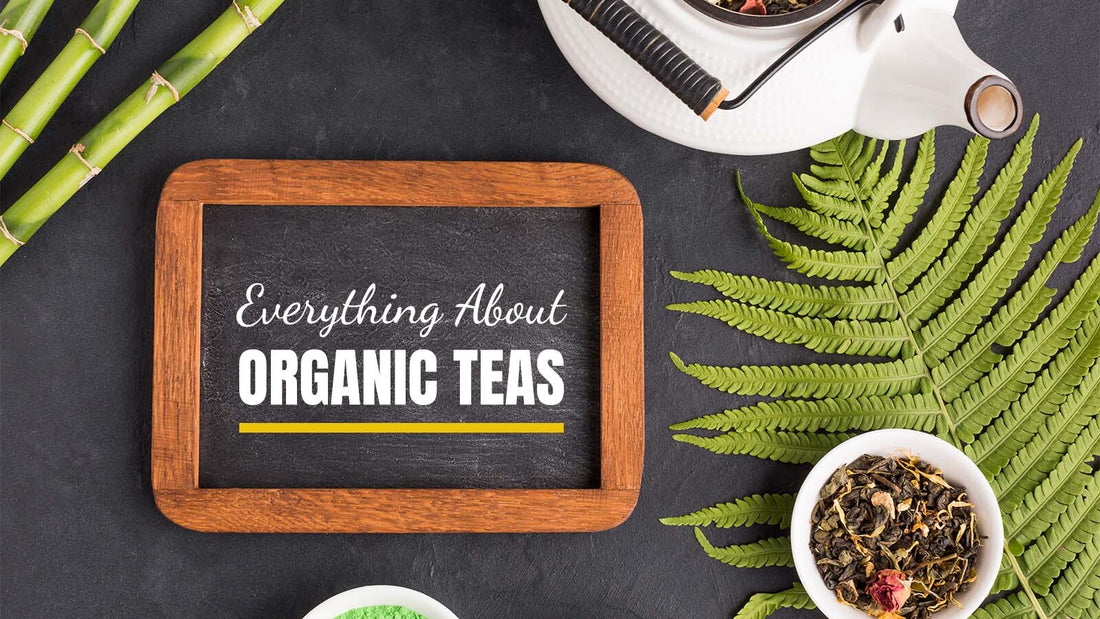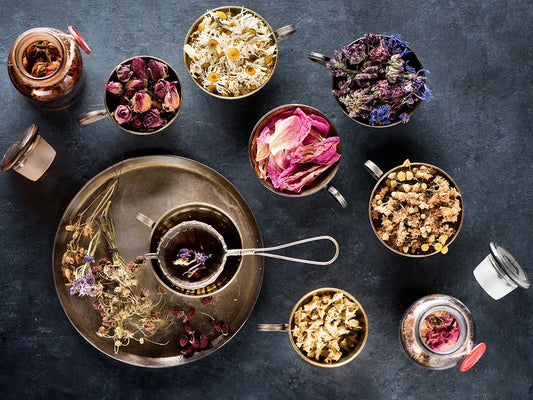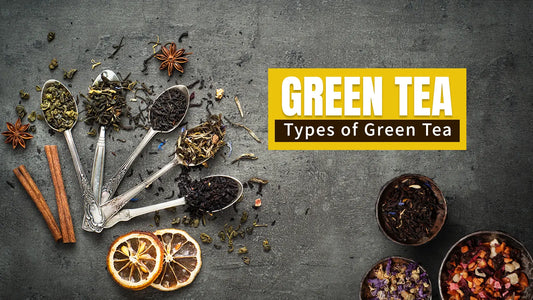Organic Teas: Everything You Need to Know

Nowadays, many people are shifting from conventional teas to organic teas. Be it for their potential health benefits, environmental sustainability, growing awareness, or personal preference.
But, when switching, you could have a lot of queries in terms of benefits, nutrition, caffeine, taste, and best organic tea types.
So, if you are also interested in knowing more, this article serves as a guide to your organic tea journey.
What is organic tea?
Organic teas are the ones that are grown and processed without implementing any harmful chemicals such as pesticides, fertilizers, or herbicides. To put it simply, these teas are processed using natural and sustainable farming techniques. But, in addition to this to be organically certified, teas must follow the highest level of standardization and quality assurance under this quality assurance check:
- Crop Standards
- Livestock and Poultry Standards
- Handling Standards
Historically, this cultivation was practiced in Nepal for high-quality tea production, promoting healthy ecosystems. Nowadays, to be called an “organic tea,” the production should fulfill certain certification standards determined by the USDA or similar organizations.
Criterions for Organic Tea
There are several organizations that set the criteria for organic teas worldwide. They are the United States Department of Agriculture (USDA), Quality Assurance International (QAI), California Certified Organic Farmers (CCOF), European Commission, EU Organic Certification Bodies, International Federation of Organic Agriculture Movements (IFOAM), etc.
According to the USDA, the tea should achieve the given set of standards in order to get organic certification.
- Synthetic fertilizers, herbicides, or pesticides are completely prohibited in tea production or growing.
- The land used for harvesting tea leaves must be free from restricted substances for at least 3 years.
- Producers or manufacturers must record every detail of activities.
- The standard should be maintained when the authorized governing body inspects the farms and facilities.
Types of Organic Tea
If you’re interested in drinking organic teas, here are several variants you could pick from.
Organic Black Tea
First, there’s organic black tea which is entirely oxidized and has a robust flavor profile. You could check out USDA-certified Mt.Pumori Organic Black Tea from Danfe tea, organic assam, organic Darjeeling, organic Earl Grey black tea, organic decaffeinated black tea, organic chai, etc.
Organic Green Tea
In case you wish to enjoy the slightly light or fresh vegetable flavor, you could opt for the best loose-leaf green teas like organic Sencha and organic Dragonwell. Or, if you love matcha, there’s organic matcha too. Compared to others, this tea offers greater health advantages.
Organic Oolong Tea
Do you want to try out the most flavorful organic oolong teas? If so, you might want to look into the organic tie guan yin or organic wuyi rock tea.
These partially oxidized teas are categorized in the middle of black and green tea.
Organic White Tea
Organic white tea has the most delicate flavor profile as it is minimally processed. It’s also low in caffeine. You may try either organic silver needles or organic white peony teas.
Organic Herbal Tea
If you’re health conscious or looking for a caffeine-free beverage, you could explore one of these best organic herbal teas.
For example: organic jasmine tea, ginger tea organic, organic lemon ginger tea, organic ginger turmeric tea, chamomile organic tea, organic cinnamon tea, organic chrysanthemum tea, and hibiscus tea organic.
Based on the tea you pick, it might provide you with a calming, fresh, or soothing effect.
Organic Pu-erh Tea
Next, for those who wish to taste the best organic pu-erh tea, there’s organic raw pu-erh and organic ripe pu-erh. These teas might provide digestive benefits.
Others
Apart from the above herbal, orthodox, or fermented teas, you might not want to miss out on these organic teas. For Instance, organic detox tea, organic peach tea, milk thistle organic tea, organic kombucha tea, etc

Health Benefits Of Organic Teas
Did you know that organic teas could potentially provide more health benefits than conventional teas? Let’s find out how and what benefits this tea offers.
Supports weight loss
A study discovered that organic teas contained relatively more catechins like epigallocatechin gallate (EGCG) and epigallocatechin (EGC) than conventional teas. So, organic teas, especially green tea, may help to promote fast oxidation, leading to weight loss faster.
May minimize the risk of cancer
Organic teas are abundant in antioxidants that may contribute to lowering the risk of cancer. Researchers have found that the catechins and polyphenols in organic tea support protecting the cells from damage.
May Improve Heart Health
According to the European Journal of Preventive Cardiology, drinking tea is linked to minimizing the risk of stroke, cancer, and heart attack. Especially, as organic teas are rich in more nutrients, they might help to reduce cholesterol levels, improving heart health.
In research with 100,902 participants, habitual tea drinkers had about 20% less risk of heart disease. However, the doctors mentioned that the research is still ongoing, followed by more people to include in the survey.
Boosts Digestive Health
Organic teas, specifically herbal teas, might help to relieve gastrointestinal pain and bloating. Drinking teas like peppermint or ginger may boost your digestive health.
Improves Mood
Consuming herbal organic teas such as lavender or chamomile may contribute to improving your mood. These teas might help to reduce cortisol levels, anxiety, worry, etc. You may as well get mental clarity with improved focus.

Organic Tea FAQs
How are organic teas different from other inorganic teas?
The main difference between organic teas and inorganic teas is the cultivation practices. While conventional teas are grown using pesticides or chemical fertilizers, organic teas don’t employ them. There are also some standard criteria organic teas must follow in order to be certified.
Does organic green tea have caffeine?
Yes, organic green tea contains caffeine. However, the caffeine level is slightly lower than the other types of organic teas like black tea or oolong tea.
Is organic green tea good for you?
Yes, drinking organic green tea might potentially contribute to various health benefits like minimizing stress, preventing cancer, supporting weight loss, etc. Studies and scientific research have explored that organic teas contain more nutrients than conventional teas.
What is the best organic tea?
Each organic tea has its own unique health benefits, taste, and profile. So, it all comes down to your preference to decide the best organic tea for you. Nonetheless, you could try organic matcha tea, organic green tea, organic chamomile tea, organic pu-erh tea, etc to figure it out by yourself.
Does organic chai tea have caffeine?
All kinds of orthodox teas naturally contain caffeine. So, yes, since organic black tea is used to brew the chai tea, it has caffeine.
Where to buy organic loose-leaf tea?
You may purchase the organic loose-leaf tea online from Danfe Tea, Amazon, Walmart etc.

Conclusion
Organic teas are more environmentally sustainable and provide numerous health benefits, while offering the same flavor as conventional tea.
If you’re able to get the right or certified organic teas, it could be a healthier gem in your lifestyle.
Try our Danfe Tea’s organic green tea and USDA-certified organic black tea. These best loose-leaf teas are all the way from the Himalayas of Nepal, produced with organic farming methods. Enjoy both delicious and healthier cups of your favorite tea. Cheers!








